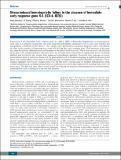Stress-induced hematopoietic failure in the absence of immediate early response gene X-1 (IEX-1, IER3)
Author(s)
Ramsey, Haley; Zhang, Qi; Brown, Diane E.; Steensma, David P.; Lin, Charles; Wu, Mei X.; ... Show more Show less
DownloadRamsey-2014-Stress-induced hemat.pdf (1.132Mb)
PUBLISHER_CC
Publisher with Creative Commons License
Creative Commons Attribution
Terms of use
Metadata
Show full item recordAbstract
Expression of the immediate early response gene X-1 (IEX-1, IER3) is diminished significantly in hematopoietic stem cells in a subgroup of patients with early stage myelodysplastic syndromes, but it is not clear whether the deregulation contributes to the disease. The current study demonstrates increased apoptosis and a concomitant decrease in the number of hematopoietic stem cells lacking this early response gene. Null mutation of the gene also impeded platelet differentiation and shortened a lifespan of red blood cells. When bone marrow cells deficient in the gene were transplanted into wild-type mice, the deficient stem cells produced significantly fewer circulating platelets and red blood cells, despite their enhanced repopulation capability. Moreover, after exposure to a non-myeloablative dose of radiation, absence of the gene predisposed to thrombocytopenia, a significant decline in red blood cells, and dysplastic bone marrow morphology, typical characteristics of myelodysplastic syndromes. These findings highlight a previously unappreciated role for this early response gene in multiple differentiation steps within hematopoiesis, including thrombopoiesis, erythropoiesis and in the regulation of hematopoietic stem cell quiescence. The deficient mice offer a novel model for studying the initiation and progression of myelodysplastic syndromes as well as strategies to prevent this disorder.
Date issued
2013-09Department
Harvard University--MIT Division of Health Sciences and TechnologyJournal
Haematologica
Publisher
Ferrata Storti Foundation
Citation
Ramsey, H., Q. Zhang, D. E. Brown, D. P. Steensma, C. P. Lin, and M. X. Wu. “Stress-Induced Hematopoietic Failure in the Absence of Immediate Early Response Gene X-1 (IEX-1, IER3).” Haematologica 99, no. 2 (February 1, 2014): 282–291. © Ferrata Storti Foundation
Version: Final published version
ISSN
0390-6078
1592-8721